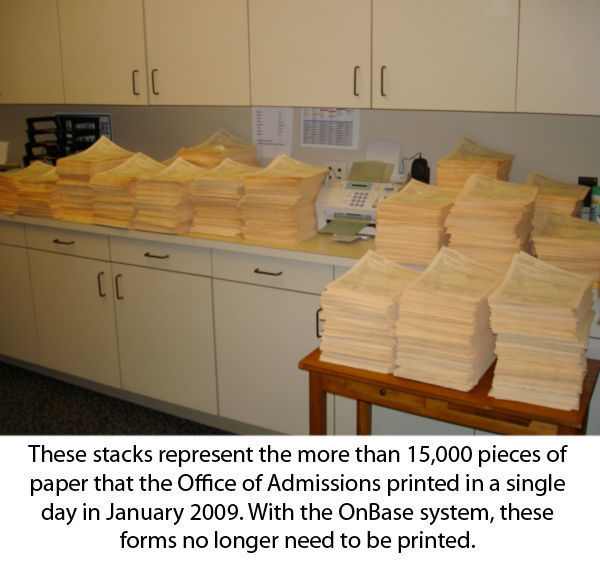
Last year, the Undergraduate Office of Admissions received its largest applicant pool ever, yet everyone in the office would say their workload had become more manageable. The Admissions Office was able to dramatically increase their efficiency and improve their customer service by implementing a new software system that allows them to do away with the old paper files.
“We would never go back to the old way,” said Mike Seeley, Associate Director and Technical Analyst for the Admissions Office. With the traditional paper file system, the Office of Admissions kept physical copies of every portion of a student’s application. Even applications submitted online would have to be printed and filed in row upon row of file cabinets that lined the walls of the office.
The new software, a system called OnBase created by Hyland Software, allows Admissions to put all components of a student’s application in a digital database. The Admissions Office heard about the software through peer institutions such as Stanford, Georgetown, and Johns Hopkins. Some universities, like Stanford, no longer accept paper applications at all. Although Notre Dame still accepts paper applications, the Admissions Office strongly encourages students to use the online application, and approximately 95% of applications are currently received online.
Some supporting documents like letters of recommendation still arrive in paper format. However, these documents and any paper applications are immediately scanned into the OnBase system and the originals can then be recycled. Undergraduate Admissions estimates that by implementing this software, it has saved more than 300,000 sheets of paper, the equivalent of 36 trees, annually. Cutting out paper also cut costs: the savings in paper supply alone totaled about $2,000 this year.
However, the staff members cite even greater benefits in terms of customer service and workload management. Under the old system, it could take more than two weeks to sort through the paper applications and supplemental forms they would receive on December 31st, the regular admission deadline, and it could take days to confirm whether the office had received a particular document.
“Now, if a parent calls to ask if we’ve received a part of their child’s application, our staff can find the documents almost before the parent has finished asking their question,” said Bob Mundy, Director of Admissions Operations.
Several features of the paperless system have revolutionized the way the Admission Office operates. OnBase allows counselors to review applications remotely, without lugging around paper files, so counselors can easily work from home. Additionally, former admissions counselors living all over the country can work part-time to help review applications.
The software also enables counselors to easily sort students according to different qualifications. For example, with the click of a button, the system can identify all applicants who played in their high school marching band, which allows the Notre Dame band department to recruit this particular subset of students. OnBase has also revolutionized the committee process by allowing multiple admissions counselors to view a student’s entire application simultaneously.
There have been surprising benefits as well. “It was amazing how quiet the office was after the switch,” noted Mundy. The constant hum of the printer and the regular slamming of file cabinet drawers were gone.
Staff members in Admissions are eager to share their success story with other offices on campus. “We hope our success will encourage other offices to go green!” said Janice Verwilst, Senior Staff Assistant.
Julia Bruckert, Lead Application Developer for Enterprise Systems (OIT), who worked with the Office of Admissions to select and implement the OnBase software, suggested that other offices on campus could follow the admissions’ office lead on cutting paper.
“One of the best parts of this software is that it’s completely customizable,” said Bruckert, who sees a great potential for this software to be implemented by other departments around campus, as the software interfaces easily with existing student information systems such as Banner.
The Office of Student Financial Services is already in the process of switching from paper files to an entirely electronic system through OnBase. But the potential for this software is not limited to student services: the Office of General Counsel has just decided to implement the software to manage its conflict of interest cases as well.